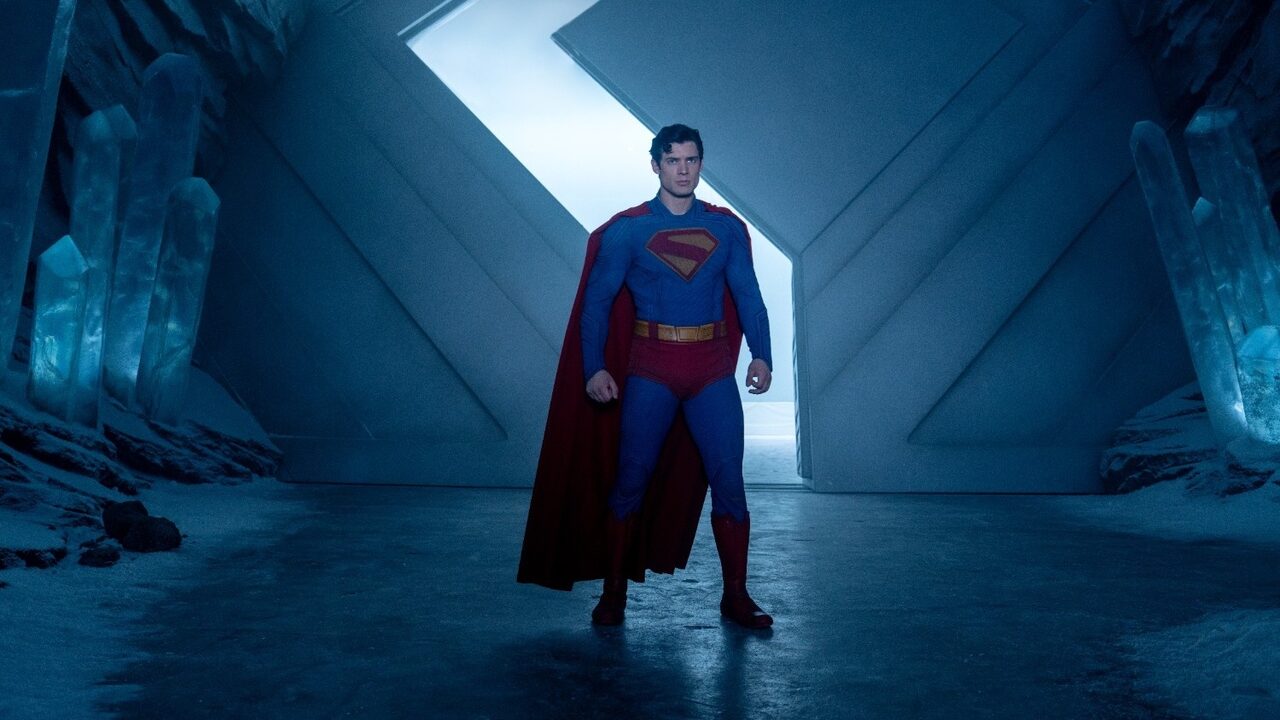
The Superman (David Corenswet) in James Gunn's Superman is not very super, man. When we first meet him, he crashes to the ground, blood running down his face. He has just lost a fight with someone named Hammer of Boravia for the first time. Superman is so paralyzed he has to call his dog, Krypto, for help, who drags him to the Fortress of Solitude, where he is healed with solar radiation. Should we still use the word "Solitude," considering there are robots for company and caretaking in this fortress? And given how easily this Man of Steel gets offended during interviews or by troll-y comments, should we call him Man of Glass or Man of Paper? Clark Kent's adoptive father, Jonathan (Pruitt Taylor Vince), is referred to as a "Big Mush" by his wife, Martha Kent (Neva Howell). But the real Big Mush is none other than Gunn himself, who sneaks in corny messages, like "You don't need to follow the advice of your parents," and "You are shaped by your choices." Gunn even recycles that sloppy device where a cute little kid is thrown into the arms of danger. Then there is Krypto, whose cuteness elicits "aww" reactions. When Superman wakes up all healed from the harmful effects of Kryptonite, the dog is seen lying on his chest. Krypto plays with the cows; he also plays with Mr. Terrific's round-shaped gadgets. Gunn presses all the easy buttons. Superman is a sentimental hokum, but this hokum is politically conscious.
After defeating Lex Luthor's (Nicholas Hoult) minions, Superman comes crashing into LuthorCorp and rebukes Lex for calling him an alien. He asserts that he's a human. We all know that under Trump's administration, undocumented immigrants have often been labeled as "illegal aliens." Superman's little speech suggests that these immigrants are not weak or hostile, and that they should be treated as humans. The titular hero is seen as an enemy after the full message from his parents is recovered and decrypted. Jor-El (Bradley Cooper) and Lara Lor-Van (Angela Sarafyan) tell their son to conquer Earth, destroy its people, and take as many wives as he wants for his harem. This notion recalls exaggerated and problematic tropes that have been unfairly attributed to certain cultures and religions. However, when Superman continues saving American citizens, delivers that speech, and ultimately saves the planet, the movie essentially tells us not to be afraid of immigrants. They can be your friends, just don't believe everything you see on the news, especially if the information is peddled by a dumb, rich billionaire. There's a reason why trolls are depicted as monkeys and Lex Luthor comes across as an Elon Musk-like figure. These insults, though, have no bite and are pretty obvious. The politics, too, is very simple. Boravia, an ally of the United States, wants to invade Jarhanpur. It's hard not to interpret this as a comment on the Israel-Palestine conflict, but the two countries, as fictional places in a fictional film, are painted with black-and-white shades. Gunn doesn't bother getting into the culture and the lifestyle of these two nations. The people of Jarhanpur are simply treated as extras on film sets who are ordered to look terrified and sad. Even Metropolis comes across as a backdrop for executing action sequences. Gunn puts too much burden on real-world events to elevate his thin depictions.
Gunn doesn't even bother giving vibrant personalities to Clark's colleagues at the Daily Planet or the members of the Justice Gang. We feel as if we are watching actors trying hard to appear "cool" or "hilarious." Green Lantern (Nathan Fillion) and his team are reduced to flat comic reliefs, while the employees of the Daily Planet just come in front of the camera to deliver their lines. No one is really memorable, except for Lois Lane, but Rachel Brosnahan brings more to the role than the role offers her (this holds true for most of the actors). She has a sweet, charming presence, which is terribly wasted. Corenswet makes for a fine Superman. You can't help but smile when he smiles and makes those dimples appear on his face. Corenswet's eyes have an innocent charm; they twinkle. We don't find much trouble in rooting for his character. But the more he draws you into the film, the more Gunn pushes you away with his vision that's lacking in wonder and magnificence. The writer-director is too sincere here, which is why Superman is devoid of that comic book exhilaration. There is no magic on the screen. What Gunn offers is "quirky moments" that have a short lifespan, like that scene where Lois and Superman talk inside the latter's apartment, and we get a light show from the window, thanks to the Justice Gang's fight with a colorful alien. Gunn moves Superman with a mechanical efficiency. He prioritizes comic book movie formulas over exploring the superhero's mind. Hence, we don't learn what Superman thinks about his first defeat, or we don't watch him reflecting on the damage done to his reputation through hashtags like #Supershit. Jor-El and Lor-Van's message should have destroyed Superman from the inside, but the inner conflicts are almost casually solved through a trip to Smallville. Gunn stops Superman from reaching exceptional heights - he has this awful habit of undermining himself. This is not a bad film by any stretch; however, it's not brilliant either. Superman is just rigidly mediocre. Is it a bird? Is it a plane? No, it's Super-meh.
Final Score- [5/10]
Reviewed by - Vikas Yadav
Follow @vikasonorous on Twitter
Publisher at Midgard Times
Get all latest content delivered to your email a few times a month.
Bringing Pop Culture News from Every Realm, Get All the Latest Movie, TV News, Reviews & Trailers
Got Any questions? Drop an email to [email protected]